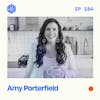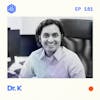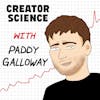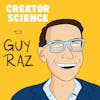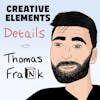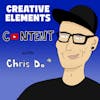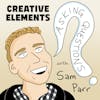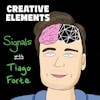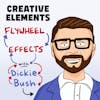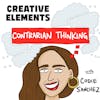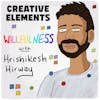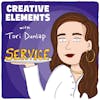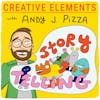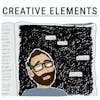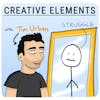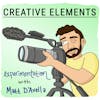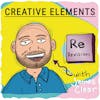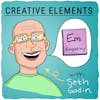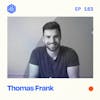
Thomas Frank is known as THE guy teaching Notion on his channel, Thomas Frank Explains.
WATCH
▶️ Watch this episode on YouTube
***
EPISODE DESCRIPTION
Two years ago, Thomas Frank made the seemingly crazy decision to abandon his 2 million subscriber YouTube channel that he spent a decade of his life building to make software tutorials.
His decision paid off big time. The @ThomasFrankExplains channel has grown to 220,000 subscribers, done over 10 million views, and doubled his revenue, just by teaching people how to use the productivity and note taking software, Notion.
In this episode, you'll learn:
- How to design the perfect viewer experience
- How to think about browse views versus
- Search the pros and cons of relying on outside platforms for success
- And what every person starting a tutorial channel needs to do
Full transcript and show notes
Thomas's Website / YouTube / Twitter / Instagram
***
TIMESTAMPS
(00:00) Abandoning a 2 Million Sub Channel
(01:17) Thomas’s New YouTube Strategy
(04:10) Why Start a New Channel?
(05:35) Browse Views vs Search Views
(08:09) When Serving the Audience is Bad for Retention
(12:01) Evaluating Platform Risk
(16:14) Permanence on YouTube
(18:40) How to Decide What Videos to Make
(19:48) How Important is Production Value
(24:32) Advice for New Tutorial Creators
(30:07) Does First Mover Advantage Matter?
***
CONNECT
🙏 Make a guest or mailbag request
📝 Check out our curated Playlists
***
SPONSORS
💼 View all sponsors and offers
***
SAY THANKS
💜 Leave a review on Apple Podcasts
Learn more about your ad choices. Visit megaphone.fm/adchoices
Jay Clouse [00:00:00]:
Two years ago, Thomas Frank made the seemingly crazy decision to abandon his 2 million subscriber YouTube channel that he spent a decade of his life building to make software tutorials.
Thomas Frank [00:00:10]:
I wanted to create a destination that people immediately thought of as the go to place to learn notion. I want to make software tutorials so good looking that people are like, why would he put this much effort into it? This is stupid.
Jay Clouse [00:00:21]:
His decision paid off big time. The Thomas Frank explains channel has grown to 220,000 subscribers, done over 10 million views, and doubled his revenue. Just by teaching people how to use the productivity and notetaking software notion in this episode, you'll learn how to design the perfect viewer experience.
Thomas Frank [00:00:39]:
I wanted to have this experience where people find a video, they click over to the channel and they realize like I want to learn notion and this is the place for it.
Jay Clouse [00:00:46]:
How to think about browse views versus.
Thomas Frank [00:00:48]:
Search views I naively thought that TF explains was going to be a search only channel that turned out to be wrong. Actually, we have more traffic from browse features and suggestions than we do from.
Jay Clouse [00:00:58]:
Search the pros and cons of relying on outside platforms for success.
Thomas Frank [00:01:02]:
You're never going to get to space by riding a bicycle you built yourself.
Jay Clouse [00:01:06]:
And what every person starting a tutorial channel needs to do.
Thomas Frank [00:01:09]:
Don't worry about the strategy, just make what you're interested in and put it up on YouTube.
Jay Clouse [00:01:17]:
It's been probably a year, more than a year since we first recorded on the channel. I want to hear how you're thinking about your YouTube strategy generally right now, and I'm going to leave it that open and ambiguous.
Thomas Frank [00:01:28]:
I have to give some context because my YouTube strategy is being informed by a bigger strategy and that is that we are launching a new startup. We are calling it flylighter and it is starting out as the best web Clipper for notion, but eventually will be just the best idea capture and knowledge capture tool that you've ever seen. That also lets you take things from the web or from your head and get them into whatever app you're using instead of it being an app where you browse that data. So that makes my strategy change quite a bit, because for the past year, couple of years, I've been almost entirely focused on teach notion, sell notion templates, be like the king of that niche. Well, now we're kind of taking the next logical step in building a tool that serves those users. But then we also have to build brand affinity and awareness for the tool itself. So rather than just relying on notion content to do that, I'm launching my main channel again and I don't just want to make productivity content again, but I realize that there is a very strong strategic reason to create productivity content. There's still stuff I want to teach around that.
Thomas Frank [00:02:31]:
So we're going to be doing some more productivity videos that may not just feature notion as the app I talk about. And then I think I also want to give myself permission to talk about some of the things that I am interested in and have developed skills in over the past couple of years on the channel, like building my no code skills, even my coding skills, talking a bit about business and entrepreneurship. And I think people like Ali Abdal have sort of demonstrated that once you've built up that affinity around your own personal brand, the audience is interested in the things that you are doing as well. It was kind of like a refreshingly simple goal to have in the past of just like, I want to become the recognized personality and expert for this growing tool that isn't mine now things are more difficult because we're trying to balance that with also building up our own startup and building brand affinity around that.
Jay Clouse [00:03:20]:
I was jealous of the simplicity of that goal. I was like, man, what's my thing? I just want to do the one thing. I thought it was great.
Thomas Frank [00:03:28]:
I feel like there's grass as greener syndrome with that, no matter who you are, no matter where you are, because I feel jealousy around that with our mutual friend Justin Welsh, who basically has his singular thing being solopreneurship. I'm over here with like, well, I've got my singular thing. It's notion, but boy, that thing over there is like singular, but also applies to a lot of different things, whereas mine is a specific tool and I have to convince people they want to learn about formulas in that tool. So there's strengths and weaknesses, no matter what niche you're in, no matter what sort of balance you have with regard to broad versus narrow focus. So it's funny to hear you say like you've experienced that kind of same jealousy because I feel it with Justin.
Jay Clouse [00:04:10]:
Help us understand why you split in the first place. Why create Thomas Frank explains versus produce the notion content on the main channel?
Thomas Frank [00:04:19]:
The main idea here is I wanted to create a destination that people immediately thought of as the go to place to learn notion. For me, it wasn't necessarily about how is the algorithm going to see this content? Because we've probably talked about this in the show before. The algorithm doesn't necessarily penalize your entire channel for having variety content. It'll just sort of push out the content that people want to see to those people and then the rest of it might just not get pushed out. But it was more a perception play more than anything else. I wanted to have this experience where people find a video, they click over to the channel and they realize like I want to learn notion and this is the place for it. And if it's on the main channel mixed in with a bunch of general productivity content, it's not going to sell that perception quite as fast. It's not going to set that first impression.
Thomas Frank [00:05:08]:
The other thing was on the flip side, the main channel was supposed to be productivity tips, life advice, personal finance, like all that more general stuff. So if I have a video that's like here's how to change your URL handler for a notion link and then put it into a shortcut, nobody cares about that. It's super niche. So again, it's just like it's all semantics, it's all taxonomy at the end of the day. But I thought it was going to be the best strategic decision for building the perception.
Jay Clouse [00:05:36]:
When you create videos on the main channel versus Thomas Frank explains, are you thinking about the way views will happen differently? Because I would think that on Thomas Frank explains, we're doing a lot of tutorials. Is the strategy for a tutorial video the same as the strategy for a more generalized productivity video on the main channel?
Thomas Frank [00:05:58]:
I don't think so. And I have to speak from my experience here more than my plans for the future, because the main channel's goals are going to be different going forward. But for the past six, seven years I've had sponsorships on the main channel. So there was very much a we want to see good conversions within the first 30 days. Thomas sort of like pressure hanging over my head. So there was very much like we want to see good performance views wise in the early days of the video on TF explains, originally I did not care about the views at all. In fact, I naively thought that TF explains was going to be a search only channel and it would never get any sort of organic promotion in the homepage or the browse features. That turned out to be wrong.
Thomas Frank [00:06:43]:
Actually we have more traffic from browse features and suggested than we do from search, but those videos are very, very long tail. I've seen multiple times videos that start out as like a ten out of ten eventually become one of the higher performing videos on the channel. I think our notion databases tutorial was like that. It was a ten out of ten for the first week or two and now it's like maybe 6th or 7th from the top. It has nearly 300,000 views, which is great for the notion niche. So yeah, it's more just like I'm going to put out an evergreen piece of content or as evergreen as it can be with a tech app that changes a lot and I'm just going to let it do its thing. It's like another piece of the library that forms the channel, whereas on the main channel I don't really feel like there's a specific library I'm building. It almost feels like I'm constructing a.
Jay Clouse [00:07:29]:
Textbook on Thomas Frank explains and on the long tail videos on Thomas Frank explains. Does that long tail come from search or is that just YouTube getting better at recommending to specific viewers who it thinks the time is right for them to learn this thing?
Thomas Frank [00:07:44]:
I actually don't think I've checked about the long tail specifically split. What I do know about the algorithm is it will continually try new audience out, new audience segments out over time, even as the video becomes older and older. And that's why you will often see random spikes in your videos, sometimes months and months after the fact. A lot of creators are like, where the heck did that come from? Sometimes it was just like the algorithm finally found the right pocket for this.
Jay Clouse [00:08:09]:
Video because you've had some very specific videos. I think about your fairly recent video about how I use AI to take perfect notes without typing over 600,000 views on a long tutorial. That seems like a very specific thing that somebody would want to do. And it's just really awesome that this level of like I know that started for you as just this curiosity, can I do this for me? That you spent like what, days on, maybe weeks on getting to work?
Thomas Frank [00:08:40]:
Not days or weeks, months. That video and I just published a new one that's unfortunately not doing as well. In fact, maybe we could talk about why I shot myself in the foot with the newest video, but I spent like an additional three months working like nights and weekends, often full days, sometimes making a much better version of that workflow that's like very plug and play. It takes the setup time from like half an hour down to five minutes. For the user it's much easier. So I'm thinking like, oh, it's going to be another viral hit. No, it's not doing nearly as well. And I think part of the reason is maybe it's the AI hype is downed out a little bit, but I think I really shot myself in the foot by being like, hey, there's a full guide that I wrote for all three versions of this workflow, Google Drive, OneDrive, Dropbox.
Thomas Frank [00:09:27]:
And I've noticed that the watch time on that video is really low. So I think it's people going, oh, the written guide is even easier than the video. Let me just click on that and leave the video.
Jay Clouse [00:09:37]:
Interesting.
Thomas Frank [00:09:37]:
So there's almost like this. Maybe I should have waited until the end to tell people there was a written guide and just had them sit through the tutorial. Yeah.
Jay Clouse [00:09:45]:
Do you see that in the retention curve?
Thomas Frank [00:09:47]:
Yeah, definitely. It's like the most clear cut case between serving the audience is a bad thing for retention in this video's case. And I almost wonder if it literally worked out better to be a kind of pain in the butt tutorial the first time.
Jay Clouse [00:10:03]:
After a quick break, we talk about how big of a role the software itself plays in your channel's success. So stick around. We'll be right back. And now back to my conversation with Thomas Frank.
Jay Clouse [00:10:16]:
I'm thinking about the role of the platform you choose. How big of a role do you think notion being the tool that you chose, played in this channel's success?
Thomas Frank [00:10:28]:
A big role. I think I would describe this as a symbiotic relationship. Part of why notion is so successful and continues to grow. To grow is kind of like that Ikea effect. It gives people this basically set of legos to play with, and that makes people really proud of what they build and they want to go share it. So notion is in this very enviable position where it has a very passionate user base that is constantly talking about it, constantly creating free content about it, and then they've developed this even more enviable position where creators have realized, as in my case, you can literally sell what you've created. So that now further incentivizes people like me and other notion creators to constantly talk about notion, not just our products, but also their product in general, because that helps to build up our audiences. I think if I had picked a tool that was sort of on the decline in terms of user base, maybe this is unfair, but I'll just pick Asana out of the air.
Thomas Frank [00:11:23]:
I don't know if Asana has quite that cultural interest right now. I don't know if it's growing in quite the same way, especially from a large user base perspective. So I'm not sure that I would have been able to grow to the same levels. However, as I'm thinking about this, I do want to bring up a counterpoint, and that is another channel called the Coda guy. Now, I think coda is not in the same boat as Asana. It's a newer app. It does have a growing user base. It is much more niche, does not have quite the same following as notion.
Thomas Frank [00:11:53]:
So when you go look at the Coda guy's channel, it's not quite as big. He doesn't usually break ten K views on a video, but he's on track to make like half a million dollars this year in revenue. Wow. And I think a lot of what he's doing is like consulting, helping companies companies build up their internal coded docs. So instead of selling like a $50 template, it might be like a $5,000 consulting session or something like that. I'm not quite sure, but yeah. He has found similar financial success in covering a tool that doesn't have sort of like the same media attention as notion.
Jay Clouse [00:12:21]:
In venture capital investing, there's this idea of platform risk is the thing that you're building on top of another thing. So there are potential existential ranks to your risk, to your thing based on that thing. Do you think about platform risk? Or should somebody watching this, who's thinking about making their own tutorials channel, how should they think about platform risk?
Thomas Frank [00:12:42]:
I do think about it a lot, actually. Just yesterday, notion had downtime and I was just like, well, yeah, this is annoying because our products don't work and people are buying our products and can't use them and we have to email them, be like, hey, try again later. It's not really us to a degree. I think there's a lot of platform risk, even if you're not covering one tool. Like, I have platform risk on YouTube. I think if that went away, I don't know how much I'd be able to leverage twitter to get the same results. I kind of think about this like a rocket. So, like, if you want to get to space, you need a lot of fuel, a lot of thrust, a lot of power, and that means you have to rely on the work of a lot of other people.
Thomas Frank [00:13:19]:
And then you get up there and eventually have to jettison parts of the rocket. You're never going to get to space by riding a bicycle that you built yourself.
Jay Clouse [00:13:25]:
I love that.
Thomas Frank [00:13:27]:
Yeah, I guess the philosophy here is platform risk is a necessary evil, but it also often functions as rocket fuel for a business. And so your job as an entrepreneur is to constantly survey the landscape, to constantly sort of do that SWOT analysis on your business strengths, weaknesses, opportunities and threats, and decide kind of on a moment to moment basis, like how much platform risk is accessible right now? Should I be diversifying or should I be totally buckling down? I think there was like an Alex Hermosi tweet a while ago. This is stuck in my head a lot. He said, you don't get rich by diversifying, you stay rich by diversifying. You typically get rich by striking it out of the park on one really big thing. So a lot of opportunities we have these days are building one really big thing on top of another platform. And it's just part of the risk that you take on as an entrepreneur. That's what we do, we take risks, right?
Jay Clouse [00:14:29]:
I've always had this. I think it's probably an irrational fear of creating videos around a tool, or even if just part of the video features a tool, because I worry that even changes in the UI of just how it looks will frustrate me to know someday. Like, the thing that is shown in that video is no longer the way things look. That has to have happened so many times in the course of doing notion tutorials. What's your relationship to platform changes that relate to videos that you've made in the past?
Thomas Frank [00:15:06]:
I'm going to tell a philosophical story to kick this one off. When I was a college student one year, these buddhist monks came to our college and they set up a gigantic roundtable in our big memorial union area. They spent an entire week very carefully pouring this finely colored sand to create what's called a mandala. It's this beautiful piece of sand art that takes them five full days, 8 hours a day, just pouring sand to create. And so they make this, and then when it's done, they do a little ceremony and they sweep it away, and it's basically an exercise in appreciating the ephemerality of life. I bring that story up because that is the mindset that I have tried to adopt when it comes to making content about tech. There is no such thing as permanence. And I think on the Internet we can convince ourselves that if we pick the right niche, we do get permanence, and we can create this evergreen content that's just never going to go away.
Thomas Frank [00:16:12]:
But the fact is, even if you pick something that is like, if you're talking about stoic philosophy, right, I can go talk about Marcus Aurelius all day long, and then next year Ryan Holiday is going to make a better video, and mine's outmoded, and I need to go make a new video because the meta shifted. So there's just no such thing as permanence. And I have accepted that as somebody who makes content about notion, eventually I'm going to have to completely reshoot notion fundamentals. I'm going to have to completely reshoot my tutorials for my products and I just embrace that. It kind of sucks. It does get frustrating sometimes, especially when it's like a small change, but it's important. But that's just sort of the trade off that I accept for getting to create content every day about a tool that I'm a huge nerd about.
Jay Clouse [00:16:55]:
How do you vet what you create videos around then?
Jay Clouse [00:16:57]:
Because I imagine you're doing so much stuff all the time. How do you decide what is too specific and nerdy? Is there too specific and nerdy? Is that actually a pro?
Thomas Frank [00:17:08]:
So I will say, despite my online veneer of business strategy mogul or whatever people want to call me, my primary driver for what I make is what I'm interested in. This can often lead to me making a two hour video about the notion API. It can lead to me making like spending three months programming something and then releasing a video where I accidentally kill the watch time. But beyond that, there is some strategy and I think it is especially clear for Thomas Frank explains, I know who I'm serving. I'm serving people who want to learn notion. So there are things that just need to be in the online video textbook that is that channel. There needs to be a video on the API, there needs to be a video on database features. There needs to be a video on just building pages and linking all that kind of stuff.
Thomas Frank [00:17:55]:
In many cases, you can literally just go into your YouTube analytics and see what your viewers are searching for. They have that research tab in analytics and you can see where your content.
Jay Clouse [00:18:02]:
Gaps are on the main channel. You have this cinematic aesthetic in the videos, in the thumbnails on, Thomas Frank explains. These aren't cinematic videos. It's not the word I would use for them. How do you think about production? Like Fidelity, b roll, all these different things that you probably spend a lot more time thinking about on the main channel than you do in? Thomas Frank explains.
Thomas Frank [00:18:28]:
Yeah, so Thomas Frank explains, had a very, very strong mission from the get go and I think that really helped me to get clear on what needed to be prioritized and what didn't. If people are coming to a video with the intent of learning how to build a task manager in notion, they probably don't need 120 frame per second slow mo broll of me drinking coffee in it. They just need a good looking video that primarily sounds good and makes very clear what needs to be accomplished and what they're going to get at the end of it. That sort of led me to making the decision early on that a lot of TF explains was going to be very templated. I'm going to stand in front of my camera 60 frames per second, make a bunch of facial expressions, and get a folder of thumbnail poses I can use forever. I'm going to use the same color background for every thumbnail. I have the same bundle of assets. Every thumbnail is going to have the notion logo in it.
Thomas Frank [00:19:23]:
It's just what it is. And that made thumbnail creation way, way easier for fidelity. I did have this sort of egocentric, but I think sort of strategic goal of I want to have the best looking software tutorials ever made. I want to make software tutorials so good looking that people are like, why would he put this much effort into it? This is stupid. So that's why I'm sitting in like a thousand square foot studio with all this stuff around me. It's just like I wanted to do that just to see if I could do it. But also I think it's going to make people talk. And then beyond that, it's just like make sure that everything is clear.
Thomas Frank [00:19:55]:
I have a lot of UI UX graphic design experience from over the years that helped me figure out how much should we zoom the screen in? When should we actually do a full zoom in? Should we highlight the mouse, show the keystrokes, all that kind of stuff on the main channel? There was never a super specific mission, right? Like it started as this is the college infogeek channel. I'm going to teach people how to be awesome at college. And there's a lot to that. Grades, career fairs, extracurriculars, everything, relationships. And then that morphed into, well, now I'm older, I guess I'm teaching the same kind of tactics and techniques, but to people who are not in a defined four year period of their life. So now it's even more general. Every video is helpful, but every video is almost like a standalone project. So that sort of brought the focus down from channel level to video level and made me focus a lot more on the artistic elements of each video and making it like a unique work.
Thomas Frank [00:20:47]:
But we also have more defined goals. As far as the business goes, I still have things I want to do on TF explains. I want to build flylighter. I have like a startup to market. So we're probably going to see less like Mountain lake videos and a little bit more of that. Let's create a show format so we can better highlight the lessons we're trying to teach instead of focusing on slick B roll and cool animations and stuff.
Jay Clouse [00:21:09]:
Yeah, I highlight that because I think it's an opportunity for people. A lot of times when I talk to aspiring youtubers, they get really caught up in production and aesthetics and all these features that make something look and sound really great. But when the goal of the video is actually knowledge transfer and comprehension, it seems like that set of considerations is secondary to accomplishing the goal, which is really good knowledge capture or knowledge transfer, which I think is a really helpful starting point for folks who are really interested in doing tutorials or doing in depth breakdowns on something very specific.
Thomas Frank [00:21:51]:
Yeah, the more specific you go, I would say the less work you have to do to sort of convince a viewer to click convince a viewer to sit down and keep watching. It's not to say there is nothing you can do, but if somebody's like, I really want to manage my tasks in notion, I don't know how to build a task manager, and then my video pops up. It's like Masterclass how to build a task manager in notion from scratch. I don't have to do a lot of work to convince that viewer to click the video they already want, that I've just presented them exactly what they want and from there I just need to show them how to build it. Whereas if it's like we're going to do a video on how to get out of a rut or how to get out of a creative rut or something like that, that is almost, I don't know if it's like too broad, but it's much broader than I need to use specific software tool to get specific result. So making it almost like let's sit down and watch this as my lunchtime video versus anything else I could choose that comes more into play.
Jay Clouse [00:22:48]:
When we come back, Thomas explains why most creators shouldn't get stuck on strategy. So don't go anywhere. We'll be right back. And now please enjoy the rest of my conversation with Thomas Frank.
Jay Clouse [00:23:00]:
For people who are watching this and they're like, okay, I have tools I like, I have things that I'm interested in. I think I might want to play around with doing a tutorials channel, anything else we haven't covered that you think they should think about or be aware of if they're going to do a tutorials channel.
Thomas Frank [00:23:15]:
The main thing I would say is most people listening to this probably aren't yet creating content or they're not doing it consistently. So don't worry about the strategy, just make what you're interested in and put it up on YouTube. And also don't worry too much about the individual results. Because again, if you're creating an entire channel that is a tutorial channel for either a specific tool or a specific purpose, like say graphic design or ux, you're creating a library of content and you can always remake videos. And if you make a video, then your ability to remake it in the future and make it 10,000 times better is going to be there because you've gotten the first rep in. Beyond that, I think a lot about content pillars on Thomas Frank explains. So I have the fundamentals pillar which is like somebody wants to learn how to use notion. So that's all the notion, fundamentals videos from the basics of creating pages all the way up through databases.
Thomas Frank [00:24:01]:
Then I have the build guides and tutorials pillar that's like the task manager tutorial. The tutorial on building a habit tracker personal portfolio website on notion. Those are typically, I think if you take outliers out, those are typically the most successful videos on the channel long term because they actually teach an outcome that people want. Whereas the fundamentals is like here's how to use the tool. It's almost like here's how to speak French versus here's how to actually go to France and have a great life there. That kind of thing. I also have the feature releases, so this is a big thing. Notion is very communicative with their ambassadors about new releases.
Thomas Frank [00:24:42]:
So we all make content about those new releases as if they're tech videos. Those videos do really well in the short term, tend to peter off after a month or so, which is totally fine. But they are a great way to bring in new interests to the channel and sort of solidify your channel as a destination to do information about the tool when new features release. And then I have your typical ten mistakes people make when they start using notion or ten ways to make notion faster, like your kind of popcorn content. That would be like the fourth pillar, I would say. I love that.
Jay Clouse [00:25:11]:
I love the idea of, I want this to be the destination for people to learn this content. Because I think if you have that goal in mind, even if you don't see the results and analytics that you hope to early on, you can ask yourself intellectually, is this serving that goal? Because I think in the beginning, probably, especially on a channel like this, where maybe recommended won't be as fast to hit. If you're doing a very specific tutorial, you need to have a long term view and really be willing to invest the time into creating the videos. Hopefully one of them hits. But if you're hitting that goal of is this making this the best channel on this topic? I think you can know you are doing the right things before you may see the results.
Thomas Frank [00:25:54]:
Oh, and I will say there's one more pillar. I didn't think about this, but with the AI voice video that came out a few months ago, that video went through multiple rounds of feedback with my friends and colleagues over at Nebula. We have like a whole feedback channel on our slack, which is probably the best thing we offer. Originally, my idea with that video was to call it like, how I take notes with my voice in notion, with chat, GPT, or something like that. We went through a bunch of different thumbnail revisions for that idea. And then my agent Dave pops in the chat and just says one thing. Would this be useful for people who don't use notion? And I'm like, well, yeah, because you get to just talk to your phone, record a voice note, and it becomes perfect transcript and summary. It just happens to be using notion as the notetaking tool.
Thomas Frank [00:26:38]:
But yeah, I guess a lot of people would like that even if they weren't using notion. So we pivoted. I didn't put notion in the packaging at all. Thumbnails, just perfect notes, no typing. Me holding up my phone with a note behind it, and then the title is how I take notes, or how I use AI to take notes with my voice without typing or something like that. But no mention of notion. That's the video that now has 600,000 views. I think it's top three or four on the channel.
Thomas Frank [00:27:03]:
And that sort of acts as a wider net that is cast that brings in a bunch of people interested in this certain outcome and then introduces notion as the tool to help them solve that problem and get that outcome. And I remember noticing that Zapier was very good at this type of marketing with their SEO strategy. So for people who don't know, Zapier is automation tool. Like a no code automation tool where you can sort of connect APIs together. So I got a new Google Forms submission and now it sends me an email. That's what you can do with Zapier. All of their content is like the best email apps in 2021, or the best to do apps in 2021. Or here's how to manage your calendar.
Thomas Frank [00:27:43]:
Like very broad, because they're going to get a certain percentage of people who are interested in those broader topics who also are going to be like, well, I really want to connect my Google Calendar up to my notion for some reason. Oh, I can use Zapier to do that. So there is a sort of like fifth developing pillar on TF explains of creating these sorts of videos, like the AI voice notes video that bring in people who might not even use notion or even know about it yet, but then will be introduced to the tool in the video about this really cool broader thing that they're interested in.
Jay Clouse [00:28:15]:
So smart, especially if someone's choosing a relatively new tool that may not have name recognition yet, which I think is a good last question. If I'm thinking about this strategy of creating a channel around a tool, do you think that I need to be concerned about first mover advantage, or is it better to choose a tool that already has some momentum?
Thomas Frank [00:28:36]:
That's a good question. I don't know if it matters. I'm kind of doing both. I would say with notion I was not first mover. Maybe I was one of the first big youtubers to create like a mainstream video on it on the main channel. But in terms of building TF explains, August Bradley already had a ton of content. Marie Poolin already had a ton of content, Red Gregory already had some content. I was definitely not the first player.
Thomas Frank [00:28:57]:
But the cool thing is, notion has a growing audience. So there's a growing subset of that audience who wants to hear from someone like me and likes my style. There's also subsets of the audience that want to hear about the topics and subtopics I've chosen to cover that maybe August Bradley or Marie Poolin didn't really cover already. I'm not sure that they had how to build a simple task manager on their channels. So I did that and my video did really well. They have other videos that talk about other things, and their videos did really well for that. So I don't think it matters too much. If there's a growing audience for something and you're passionate about it and you're building skill in that area, that's a good, good spot to be in.
Thomas Frank [00:29:36]:
Regardless of whether or not there are other players.
Most Popular Episodes
New to the show? Check out some of our most popular episodes.






